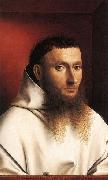La Peinture à l'huile en gros de Chine & Encadre |
|||||||||||

|
|||||||||||
|
|
|
||||||||||||||
|
CHRISTUS, Petrus
Netherlandish Northern Renaissance Painter, ca.1410-1473 |
||||||||||||||
|
|
||||||||||||||
|
||||||||||||||
|
|
||||||||||||||
| CHRISTUS, Petrus
Netherlandish Northern Renaissance Painter, ca.1410-1473 Potrait_of_a_Carthusian 1446 Oil on wood, 29,2 x 21,6 cm Metropolitan Museum of Art, New York In 1444, three years after the death of Jan van Eyck, Petrus Christus left his homeland in the northern Netherlands to settle in Bruges. This portrait, one of Christus's earliest signed and dated works, shows van Eyck's influence in the technical virtuosity of the trompe-l'oeil fly and the carved inscription. The sitter, once transformed into a saint by the addition of a halo, is an unknown lay brother of the Carthusian order. The fly is a symbol of decay, a reminder of man's mortality, but it also greatly enhances the fiction of a real person gazing at us from behind a stone ledge in which Christus's signature appears as an incised inscription. , Artist: CHRISTUS, Petrus , Potrait of a Carthusian , 1451-1500 , Flemish , painting , portrait 1446 Oil on wood, 29,2 x 21,6 cm Metropolitan Museum of Art, New York In 1444, three years after the death of Jan van Eyck, Petrus Christus left his homeland in the northern Netherlands to settle in Bruges. This portrait, one of Christus's earliest signed and dated works, shows van Eyck's influence in the technical virtuosity of the trompe-l'oeil fly and the carved inscription. The sitter, once transformed into a saint by the addition of a halo, is an unknown lay brother of the Carthusian order. The fly is a symbol of decay, a reminder of man's mortality, but it also greatly enhances the fiction of a real person gazing at us from behind a stone ledge in which Christus's signature appears as an incised inscription. , Artist: CHRISTUS, Petrus , Potrait of a Carthusian , 1451-1500 , Flemish , painting , portrait |
||||||||||||||
|
Related Paintings to CHRISTUS, Petrus :. |
||||||||||||||
|
|
||||||||||||||
|
|
||||||||||||||
|
CONTACTER DES Etats-Unis |







